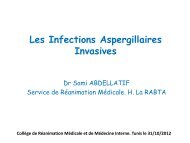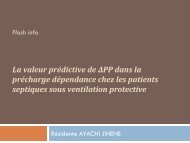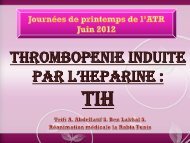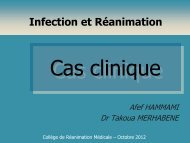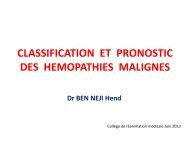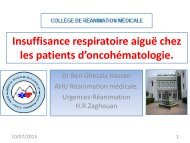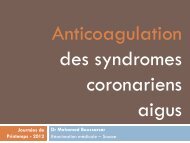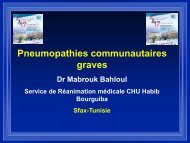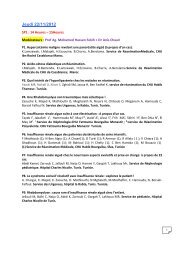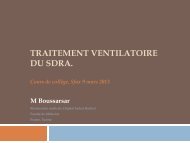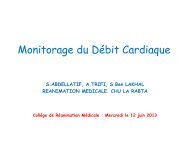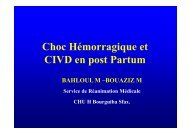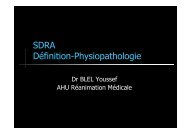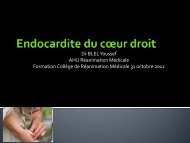NUTRITION PARENTERALE EN REANIMATION QUAND? - ATuRea
NUTRITION PARENTERALE EN REANIMATION QUAND? - ATuRea
NUTRITION PARENTERALE EN REANIMATION QUAND? - ATuRea
Create successful ePaper yourself
Turn your PDF publications into a flip-book with our unique Google optimized e-Paper software.
<strong>NUTRITION</strong> <strong>PAR<strong>EN</strong>TERALE</strong> <strong>EN</strong><br />
<strong>REANIMATION</strong><br />
<strong>QUAND</strong>?<br />
NOZHA BRAHMI<br />
Service de Réanimation R<br />
Médicale M<br />
– CAMU<br />
16 ème Congrès National de Réanimation- 25-26 Novembre 2011
PREREQUIS 1<br />
INDISCUTABLEM<strong>EN</strong>T<br />
Lorsque le TD fonctionne utilisez le !!!<br />
- Maintien intégrité fonctionnelle et morphologique du TD<br />
- Favorise la motilité digestive et donc la reprise progressive de la nutrition orale<br />
- Réduction de la translocation bactérienne<br />
- Meilleure utilisation des substrats<br />
- Meilleure tolérance au glucose<br />
- Réduction des infections sur cathéter
PREREQUIS 2<br />
Dénutrition<br />
40% des patients hospitalisés<br />
- Ce déficit peut augmenter<br />
(selon comment nous allons les nourrir)<br />
- D’autant plus que le patient est hospitalisé en réanimation
PREREQUIS 2: CONSEQU<strong>EN</strong>CES<br />
• Pourcentage d’infection, coût<br />
Rubinson L,et al. Crit Care Med 2004, 32:350-357<br />
• Autres complications<br />
- durée de ventilation,<br />
- durée d’hospitalisation<br />
• Mortalité<br />
Dénutrition<br />
Commence tôt (4-5j)<br />
Villet S et al. Clin Nutr 2005, 24:502-509. Dvir D, et al. Clin Nutr 2006, 25:37-44.
PROBLEMATIQUE<br />
Prôblèmes rendant la nutrition entérale difficile<br />
Intolerence gastro intestinale<br />
• Manque d’appetit (sedatifs, opioids, catecholamines)<br />
• Motilité<br />
Regurgitation<br />
réduite (amines et sedatifs)<br />
• Absorption Distension incertaine voire colectasie<br />
• Syndrome du compartiment abdominal
Absorption intestinale après chirurgie cardiaque<br />
d’après Berger MM et al. CCM 2000; 28: 2217<br />
Paracetamol 15 mg/kg
PROBLEMATIQUE 2<br />
La NE précoce ( < 3 j )<br />
COMMEMCER PAR FAIBLE<br />
QUANTITE<br />
Aport calorique cumulé < 70%<br />
Barr J,et al.<br />
Chest 2004, 125:1446-1457.
• Etude Allemande<br />
• Prospective<br />
• 231 patients<br />
• 500 Kcal à J1<br />
2000 Kcal à J4
PREREQUIS 3<br />
La NE précoce ( < 3 j )<br />
COMMEMCER PAR FAIBLE<br />
QUANTITE<br />
Aport calorique cumulé < 70%<br />
Barr J,et al. Chest 2004, 125:1446-57<br />
Sirak Petros. Clinical Nutrition 2006:25, 51–59<br />
STOP<br />
Desachy A, et al.<br />
Intensive Care Med 2008, 34:1054-9.<br />
ALORS QU’ON SAIT QUE TOUT CE PASSE LA<br />
PREMIERE SEMAINE
PRINCIPALES ETUDES
Negative impact of hypocaloric feeding and energy<br />
balance on clinical outcome in ICU patients<br />
• Etude Suisse<br />
• 48 patients de SI<br />
• Au delà de 5 j, évaluer le bilan d’energie<br />
Villet et al. Clinical Nutrition 2005;24,502
Negative impact of hypocaloric feeding and energy<br />
balance on clinical outcome in ICU patients<br />
• Etude Suisse<br />
• 48 patients de SI<br />
• Au delà de 5 j, évaluer le bilan d’energie<br />
Villet et al. Clinical Nutrition 2005;24,502
Computerized energy balance and complications in<br />
critically ill patients: An observational study.<br />
Dvir D et al. Clinical Nutrition (2006) 25, 37–44
Computerized energy balance and complications<br />
in critically ill patients: An observational study.<br />
Dvir D et al .clin Nutr 2006;25,37
The relationship between nutritional intake and clinical outcomes in<br />
critically ill patients: results of an international multicenter<br />
observational study.<br />
37 pays, 167 ICU<br />
Intensive Care Med (2009) 35:1728–1737
A 10-year survey of nutritional support in a surgical ICU: 1986-1995. Berger<br />
MM et al. Nutrition 1997; 13: 870-7<br />
Travail prospectif, 171 patients > 3j d’hospitalisation<br />
100 patients avec nutrition artificielle
Enteral nutrition in critically ill patients with severe<br />
hemodynamic failure after cardiopulmonary bypass<br />
18 patient de chirurgie cardiaque<br />
Sous BCPA<br />
+<br />
Fortes doses de NAD/ DOBUTAMINE/DOPAMINE<br />
PROTOCOLE: NE seule à partir de J1<br />
Berger MM. Clinical Nutrition (2005) 24, 124–132
CETTE meta-analyse a aboutit à des guidelines<br />
Intensive Care Med 2005; 31:12–23
The European Society for Parenteral and Enteral Nutrition<br />
guidelines for parenteral nutrition in intensive care<br />
recommend the administration of supplemental parenteral<br />
nutrition within 2 days after ICU admission to patients who<br />
cannot be fed sufficiently via the enteral route .<br />
Clinical Nutrition 28 (2009) 387–400
Travaux pronostiques comparatifs<br />
NE seule vs NE + NPT.
Etude canadienne<br />
Design:<br />
A multicenter, observational<br />
study.<br />
Setting:<br />
260 ICU from 33 Countries.
Equipe de Berger MM. Crit Care Med 2012 Vol. 40, No. 1 1
maximal target of 2880<br />
kcal/day.<br />
When <strong>EN</strong> covers 80% of<br />
calculated caloric needs,<br />
PN is stopped.<br />
Early PN initiated the<br />
second morning in ICU<br />
When (NRS ≥ 3)<br />
<strong>EN</strong> < 80% of calculated<br />
caloric needs at day7,<br />
initiated PN
• The primary efficacy endpoint for this RCT is the<br />
time to discharge alive from ICU.<br />
• Secondary efficacy endpoints<br />
- Time to discharge alive from the hospital<br />
- Time to final (alive) weaning from mechanical respiratory support<br />
- Proportion of patients in need for renal replacement therapy (RRT)<br />
during ICU stay<br />
- Need for pharmacological or mechanical hemodynamic support during<br />
ICU stay, and duration of such need.<br />
- Need for a tracheostomy during ICU stay.<br />
- Occurrence of infections during ICU stay<br />
Results non published
CONCLUSION<br />
• Patients de Réanimation:<br />
Problème d’intold<br />
intolérance digestive<br />
Haut risque de dénutrition/NRS d<br />
> 3<br />
• NE indiscutable/ insuffisante chez certains<br />
patients<br />
• Supplémentation précoce par une NP
MERCI



